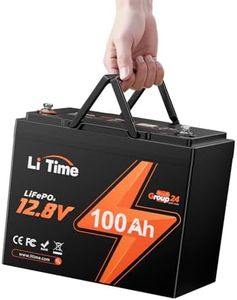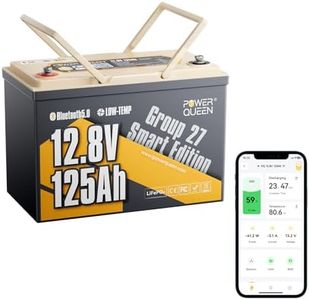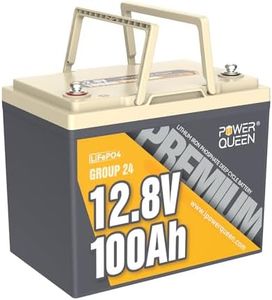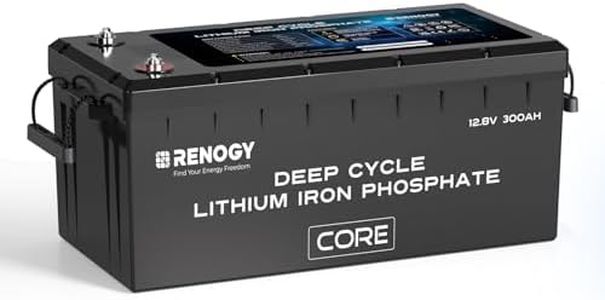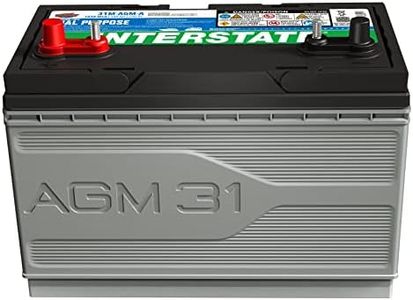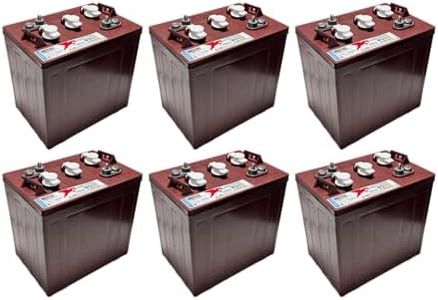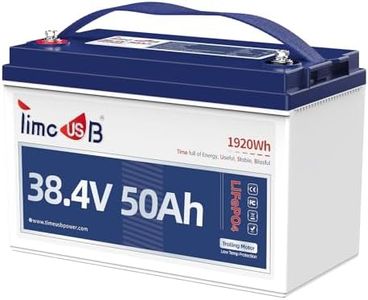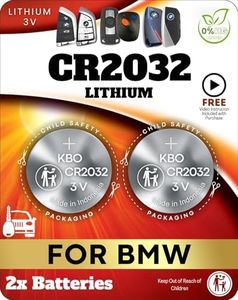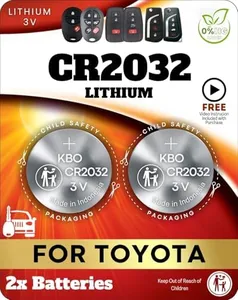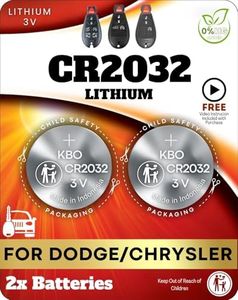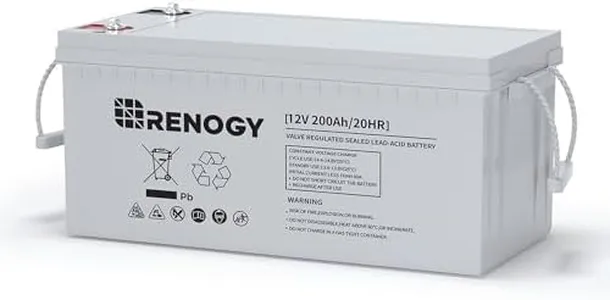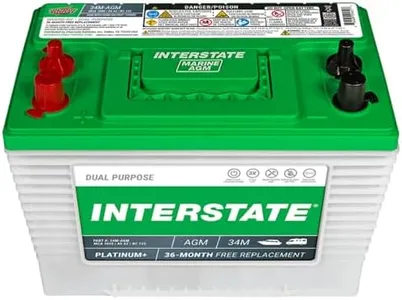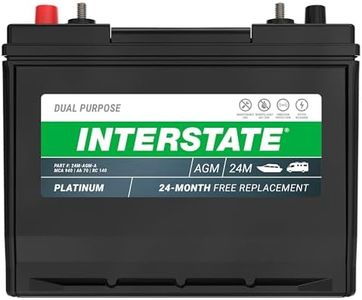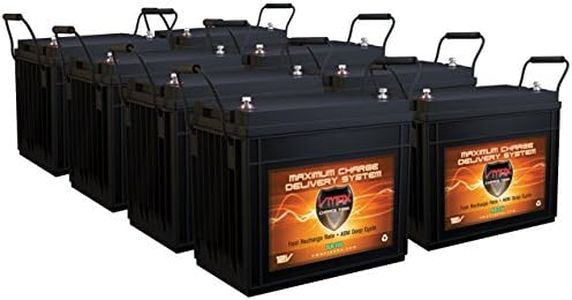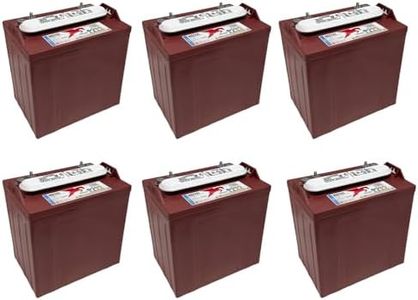10 Best Deep Cycle Batteries For Power Inverter 2026 in the United States
Our technology thoroughly searches through the online shopping world, reviewing hundreds of sites. We then process and analyze this information, updating in real-time to bring you the latest top-rated products. This way, you always get the best and most current options available.

Our Top Picks
Winner
Power Queen 12.8V 125Ah Bluetooth LiFePO4 Battery, Group 27 Size &1600Wh Energy, Deep Cycle Lithium Battery with Low-Temp Cut Off, Perfect for RV, Marine, Off-grid, Solar System, Backup Power
Most important from
10 reviews
The Power Queen 12.8V 125Ah LiFePO4 battery is a solid choice for those needing a deep-cycle battery for RVs, boats, off-grid solar systems, or backup power. Its Group 27 size fits many standard installations, and with 1600Wh of energy, it offers more capacity than typical 100Ah lithium batteries, meaning longer runtime for your devices. The battery’s lithium iron phosphate chemistry ensures a long service life—up to 15,000 cycles or about 10 years—which is far better than traditional lead-acid batteries that usually last only a few hundred cycles.
One standout feature is its built-in Bluetooth 5.0, letting you monitor battery health and status in real time via an app, including charge level, temperature, and warnings. This remote control ability adds convenience and peace of mind. The battery management system adds extra safety by protecting against overcharging, over-discharging, and working within a temperature range that includes cold weather operation (though charging stops below 32°F). At about 25 pounds, it’s relatively lightweight for its capacity, making it easier to handle.
While the initial cost of this lithium battery is higher than lead-acid types, its longevity and performance make it a smart investment if you want fewer replacements and more reliable power. The 5-year warranty and responsive customer service are additional benefits. If you want a dependable, long-lasting battery with modern monitoring features and can handle the upfront cost, this Power Queen model is worth considering for deep-cycle power needs.
Most important from
10 reviews
Power Queen 12V 100Ah LiFePO4 Battery BCI Group 24 Lithium Battery, Deep Cycle Battery with 100A BMS, 1280Wh, Up to 15000 Cycles & 10-Year Lifespan for Trailer RV, Motor Home, Marine
Most important from
150 reviews
The Power Queen 12V 100Ah LiFePO4 battery is a strong choice for anyone needing reliable, long-lasting power storage for trailers, RVs, marine use, or solar systems. It delivers a solid 12.8 volts and 100 amp-hours of capacity, which is typical for deep-cycle batteries in this category. What really stands out is its impressive cycle life—up to 15,000 cycles at 60% depth of discharge—meaning it can be charged and drained many times over about 10 years, far exceeding most lead-acid batteries. The lithium iron phosphate chemistry also makes it lighter (around 20 pounds) and safer with a built-in 100A battery management system that protects against overcharging, overheating, and other common issues.
Its size fits standard Group 24 battery boxes, and it can easily replace older lead-acid batteries without needing changes to your setup. It supports series and parallel connections, so you can expand capacity or voltage for bigger systems. On the downside, this battery is not designed for engine starting—it's meant specifically for energy storage and continuous power delivery, not quick bursts of high current. Also, while the battery handles typical temperature ranges well, extreme cold might still affect performance somewhat, which is common for lithium batteries.
Charging should be done carefully with recommended voltage and current to get the best lifespan. If you want a dependable, compact battery that lasts a long time and fits most standard setups, this Power Queen model is a solid pick. Keep in mind that it is designed for deep cycling power, not for engine cranking or golf carts.
Most important from
150 reviews
Renogy 12V 300Ah Self heating Lithium LiFePO4 Deep Cycle Battery, 5000+Deep Cycles, 200A BMS,Backup Power for Trolling motor, Cabin,Marine, Off-Grid Home Energy Storage-Core Series
Most important from
4 reviews
The Renogy 12V 300Ah Self-Heating Lithium LiFePO4 Deep Cycle Battery is a solid choice for those in need of reliable, long-lasting power solutions, especially for off-grid setups, marine applications, or backup systems. With an impressive capacity of 300Ah and a cycle life exceeding 5000 cycles, it offers substantial longevity compared to traditional lead-acid batteries. One of its standout features is the 200W self-heating capability, which allows the battery to function efficiently even in cold temperatures as low as -4℉, making it ideal for varied climates.
The battery's built-in 200A battery management system (BMS) ensures safe operation by managing high discharge currents and providing protection against low temperatures. Additionally, the capability to connect multiple batteries in series or parallel allows for easy scalability, which is beneficial for users looking to expand their energy storage.
The initial cost of lithium batteries, including this model, can be higher than that of lead-acid alternatives, which might deter budget-conscious buyers. Some users may also find the weight and size of the battery to be a consideration when planning their setup. While customer support is responsive, new users may encounter a learning curve when it comes to installation and integration with existing systems.
Most important from
4 reviews
Buying Guide for the Best Deep Cycle Batteries For Power Inverter
Choosing the right deep-cycle battery for your power inverter is crucial to ensure you get the most efficient and reliable performance. Deep-cycle batteries are designed to provide a steady amount of power over a long period, making them ideal for use with power inverters. When selecting a deep-cycle battery, it's important to consider several key specifications to ensure it meets your needs and provides the best performance for your specific application.FAQ
Most Popular Categories Right Now
